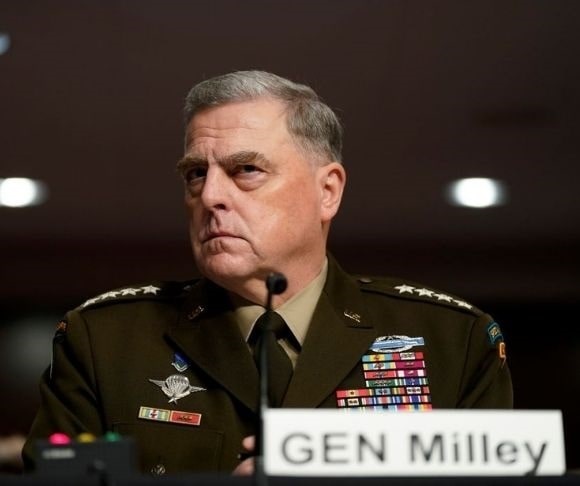It’s uncommon in the collegial arena of executive branch relations for a public blame-fest to break out. But that’s what Fox News suggested happened at the House Armed Services Committee (HASC) hearing. Though Liberty Nation has been at the forefront, reporting on the foibles, missteps, and poor plan execution of the U.S.’s chaotic withdrawal from Afghanistan, finger-pointing within the Biden administration is new. The HASC hearing on September 29 featured the same witnesses as the Senate Armed Services Committee hearing the day before: Secretary of Defense Lloyd Austin III, Chairman of the Joint Chiefs of Staff General Mark Milley, and the commander of U.S. Central Command, Marine General Kenneth McKenzie.
A news media account of the Department of Defense witnesses throwing the State Department under the bus is a little more dramatic than the words used by Secretary Austin convey in context. Nonetheless, the sentiment expressed by Secretary Austin would typically be more circumspect in public. As Fox News reported:
“Top Pentagon officials blamed the State Department for not beginning evacuations of civilians from Afghanistan sooner, calling the efforts ‘chaotic,’ while defending the ‘skill and leadership’ of US troops during a hearing before the House Armed Services Committee Wednesday [September 29] focused on the military withdrawal.”
 The testimony from Secretary Austin addressed why we didn’t “start withdrawing American citizens and SIVs sooner. We knew we were going to be withdrawing, whether we started in January or May or sooner than the actual execution.” Secretary Austin did say that on the issue of “why we didn’t bring out civilians and SIVs sooner…is really a State Department call.” The word “chaotic” did creep into his answer. Still, Austin went on to say that the State Department was being cautioned by President Ashraf Ghani (president of Afghanistan at the time) that if the Americans and the SIV applicants were withdrawn “at a pace that was too fast, it would cause a collapse of the government that we were trying to prevent.” Despite caution with which the State Department deferred to the former-Afghan president’s warning, Ghani slinked out of Kabul, secretly leaving his country. The government collapsed.
The testimony from Secretary Austin addressed why we didn’t “start withdrawing American citizens and SIVs sooner. We knew we were going to be withdrawing, whether we started in January or May or sooner than the actual execution.” Secretary Austin did say that on the issue of “why we didn’t bring out civilians and SIVs sooner…is really a State Department call.” The word “chaotic” did creep into his answer. Still, Austin went on to say that the State Department was being cautioned by President Ashraf Ghani (president of Afghanistan at the time) that if the Americans and the SIV applicants were withdrawn “at a pace that was too fast, it would cause a collapse of the government that we were trying to prevent.” Despite caution with which the State Department deferred to the former-Afghan president’s warning, Ghani slinked out of Kabul, secretly leaving his country. The government collapsed.
One issue that traveled from the SASC to the HASC hearings was the abandonment of Bagram Air Base. More clarity on why the U.S. did not keep Bagram came to light. To the question of what prompted not using Bagram, General McKenzie said:
“This is important; the Bagram option went away when we were ordered to reduce to 650 personnel in Kabul. Had we held to 2,500 [personnel], which I’ve stated in my position, and as the Secretary has articulated, it would have been a clear risk that the Taliban would have begun to attack us as we moved past the 1 May deadline. However, it was my judgment then that that would have given us a platform for negotiations with the Taliban to force a political solution.”
The reduction to a force of 650 personnel to protect the U.S. Embassy and its staff was not a military decision but appeared to have come from the State Department and the White House.

Gen. Mark Milley
(Photo by Patrick Semansky-Pool/Getty Images)
The trio of military witnesses did get some pointed questions that left viewers of the hearing wondering, “so, what is next?” For example, General McKenzie was asked about the ability of the U.S. to be effective in what will be an over-the-horizon response to a counterterrorism mission. Since Afghanistan is landlocked, flying to and from Afghanistan to engage terrorist strongholds or other targets requires securing overflight permissions from surrounding nations. Congressman Doug Lamborn (R-CO) asked McKenzie: “Has the administration, as of today, secured any necessary agreements with a neighboring country to provide basing and overflight requirements to perform over-the-horizon in landlocked Afghanistan?” The CENTCOM commanders responded, “as of today, I have the ability to enter Afghanistan and to fly missions. It’s a long haul in, but I have the ability to do that today.”
Lamborn pressed the general on whether the U.S. had agreements with neighboring countries. “Obviously, it’s a neighboring country that’s allowing us access, but we are not based in a neighboring country,” McKenzie responded.
General Milley made clear the importance of the U.S. having the capability to deal effectively with a renewed terrorist threat that is real. Brook Singman wrote for Fox News:
“Milley, during the hearing Wednesday, called the war in Afghanistan a ‘strategic failure’ for the United States and warned that the Taliban ‘remains a terrorist organization’ and maintain ties with al Qaeda. ‘The Taliban was and remains a terrorist organization, and they still have not broken ties with al Qaeda,’ Milley testified. ‘I have no illusions who we are dealing with.’ He added, again, that the Taliban ‘have not broken with al Qaeda.'”
At the end of two days of hearings and listening to the Pentagon’s most senior leaders attempting to explain what went wrong, it’s still a mystery. Unfortunately, Americans are left with the potential for a resurgence in terrorist capability from the same old terrorist organizations like ISIS-K and Al Qaeda. Furthermore, the Biden administration’s ignominious, blundering withdrawal from Kabul the world witnessed will most likely embolden terrorist groups across the globe. And above all this, one question lingers: Are Americans safer now from a terrorist attack than we were 20 years ago?
The views expressed are those of the author and not of any other affiliation.
~ Read more from Dave Patterson.




